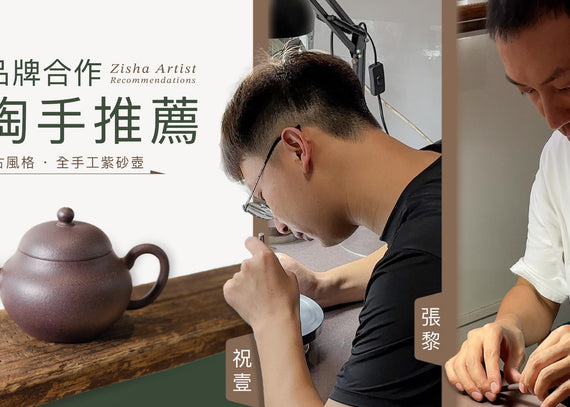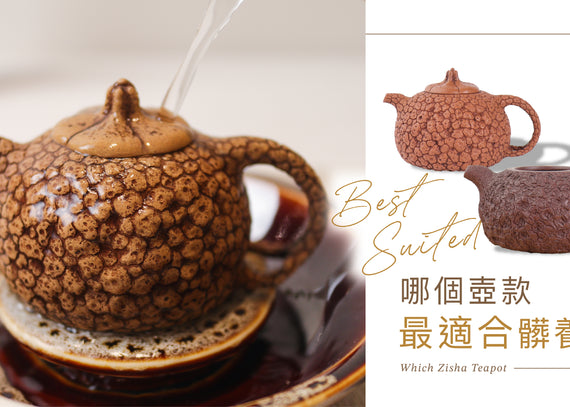每隻紫砂壺都「開壺」的步驟才能使用,不過很多人也忽略了一些細節。只要三個動作,便可了解自己的紫砂壺質素。現在就告訴大家一些在開壺過程中要留意的地方和要點。
為什麼要開壺?
一般使用紫砂壺前要先開壺絕大部分的原因都離不開「清潔」二字。紫砂壺是使用紫砂泥料製作而成,在燒製的過程中有些礦泥顆粒或者粉塵會藏在壺身的小縫隙中,因此開壺的目的在於把這些顆粒塵埃煮出來,清理乾淨,以免正式使用時會隨著茶水被泡出,導致茶湯混濁,影響茶湯味道,甚至影響健康。當然,在開壺的過程中,使用優質泥料的紫砂壺,壺身毛孔會因為熱力而張開,因此行內人或者是用經驗的用家會從開壺去鑑別泥料的好壞。
開壺的過程其實很簡單,首先準備一鍋能沒過紫砂壺的開水,將壺持續煮一段時間。坊間對於煮壺的時間眾說紛紜,有的説幾分鐘就可以,有的卻需要煮一小時。大部分情況,煮壺的時間建議在1小時左右。優質的紫砂壺泥料其實可以承受上千度熱度,所以煮的時間久一些也沒有關係,開壺旨在將壺內的顆粒和粉塵煮出來。當然用家也可以視乎紫砂壺的情況加長煮壺時間,盡可能將壺內的礦物碎屑和塵埃清理乾淨。
(煮壺時間視乎紫砂壺乾淨程度而定,毋須特意延長。)
煮壺的後續步驟才是重點 三個動作更了解紫砂壺
煮壺過後,基本上整個開壺的過程已經完成一半,不過接下來的三個舉動卻是很多人也忽略了。只要三個動作,便可了解自己的紫砂壺質素如何。
1.觀察 | 顏色變化 水氣蒸發
紫砂壺經過高溫煮過後,顏色會出現微微變化。用料好的壺色澤變化會比較均勻一致,泥料不好或者混泥,壺身則會出現一塊塊、不均勻的變色。甚至有染過色的紫砂壺在煮壺過後,水也會跟著變色。除了顏色變化,在煮壺後將壺撈出並再次淋上熱水,也可以看見紫砂壺的泥料優劣與否。由於紫砂泥料具有透氣特性,好的泥料在淋上熱水時候會呈片狀蒸發,水氣在壺身消失的速度會較均勻。相反用料不好紫砂壺在淋熱水時,壺身不會掛水,並呈水珠形流走,很少甚至沒有蒸發情況。不過需要留意的是,每種紫砂泥料的目數不同,會影響紫砂掛壺的狀態。例如朱泥的目數較高,泥料排列較緊密,壺身掛水也比較少,而其他目數較低泥料如紫泥,掛水的效果則會更明顯。因此只要仔細觀察,其實可以對紫砂壺的泥料有個概念。
(好的泥料色澤變化會比較均勻一致,在淋上熱水時候會呈片狀蒸發,掛水的效果則會更明顯。)
2.嗅聞 | 泥土味道 v.s. 刺鼻味道
煮壺過後,我們要聞聞看紫砂壺的內部有沒有異味或刺鼻味道,用料優質的壺在熱水浸泡後理應沒有異味,或者只有少許泥土味。一些用料不佳,甚至是化工壺,在經過高溫煮過之後都會散發出難聞刺鼻的氣味。要留意有些泥料如底槽青,本身泥料的氣味會比較大,所以煮壺後壺內的氣味也不少,所以在嗅聞這個步驟前,要了解清楚紫砂壺使用什麼泥料製作而成,不能只單靠觀察或氣味去判斷紫砂壺之優劣。
(用料優質的壺在熱水浸泡後沒有異味,只是留意有些泥料氣味會比較大,只要不是散發出難聞刺鼻的氣味即可。)
3.觸摸 | 清理顆粒粉塵 檢查細小裂縫
完成煮壺、淋水的步驟後,紫砂壺沒有開裂、掉色或出現難聞味道,基本上就算及格,可以使用了。但細心一點的話可以觸摸內部壺璧,檢查是否還有紫砂顆粒存在,或者紫砂壺內部有沒有裂縫。如果是前者,只需重複煮壺的步驟進行清理即可,但發現有裂縫的話,就證明該紫砂壺不能承受高溫,這有可能是泥料用料不精的問題。
(透過觸摸內部壺璧可以檢查是否還有紫砂顆粒存在,或者紫砂壺內部有沒有裂縫。)
以上就是基本開壺步驟以及三個開壺時的小撇步。紫砂壺只要依照步驟進行開壺,加上精心養護,自然能夠用得長久。
建議閱讀:
更多茶品:All Zisha Teapot










